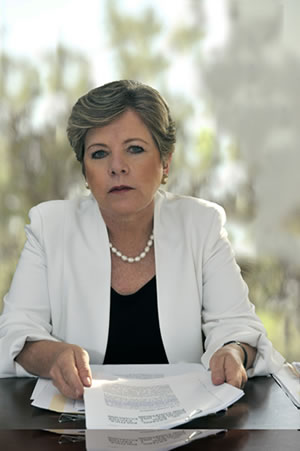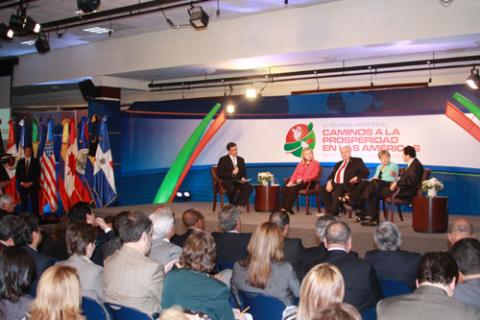Press Release
(10 November 2011) The Executive Secretary of the Economic Commission for Latin America and the Caribbean (ECLAC), Alicia Bárcena, reaffirmed the importance of improving regional integration in order to deal with global economic turbulence.
The senior representative of the United Nations gave a presentation entitled "Latin America in face of the crisis. Cyclical and structural aspects and the possible impact on trade" during the 1126th Extraordinary Session of the Latin American Integration Association (ALADI) Committee of Representatives, which was held on Wednesday 9 November in Montevideo, Uruguay.
The session was led by the Secretary General of ALADI, Carlos Álvarez, and the Ambassador Cassio Luiselli. The meeting was attended by diplomats and representatives from the 12 countries which form part of the organization: Argentina, Bolivia, Brazil, Chile, Colombia, Cuba, Ecuador, Mexico, Paraguay, Peru, Uruguay and Venezuela.
Ms. Bárcena asked the countries for greater integration and a joint Latin American response to deal with the problems of the economic crisis.
"The crisis shows a turning point where the continuity of a model reverted, a model which is associated with 20 years of wealth concentration," she stated.
She added that this has created spaces for great debate on the future of the economic stockpiling rationale, the standards of the global economic system, the role of public policies and the lack of global institutionality to deal with and solve global systemic problems.
"There are significant global imbalances. The conditions in industrialized economies have grown worse and slow growth is on the horizon for them over the next years," she explained. "Fiscal and public debt challenges threaten the industrialized countries with a lost decade 2011-2020," she stated.
She said that there are significant global imbalances and that the main mechanisms governing the global economy require adjustments.
"The difficulties in industrialized countries start to affect emerging economies and Latin America and the Caribbean is not the exception," she advised. However, she explained that, "South-South trade is more important at present than North-North trade and that in general, trade moves from the North to the South and from the Atlantic to the Pacific."
Ms. Bárcena called for more interregional trade and fiscal matters, investment, innovation and social policies to be prioritized, and she stated that the region should adapt to climate change, as an additional challenge to sustainable development.
At the same time, she said that in the event of a new recession in developed countries or a new global financial crisis, emerging countries' room for manoeuvre will depend on their external balance and their international reserves, their fiscal and monetary policy space and the structure of their foreign trade in terms of products and markets.
The Executive Secretary of ECLAC highlighted that the region faces this situation with great assets, but also significant weaknesses such as current account deficit, a production and exports structure based on static comparative advantages rather than dynamic comparative advantages, low investment and lags in innovation, science and technology, education and infrastructure, and high costs of insecurity and violence.
"We have the challenge of dealing with the volatile situation without compromising lessons learned, progressing from stability objectives to development and productive convergence agendas," she underlined.
Any queries should be addressed to the ECLAC Public Information and Web Services Section. E-mail: dpisantiago@cepal.org; Telephone: (56 2) 210 2040.


